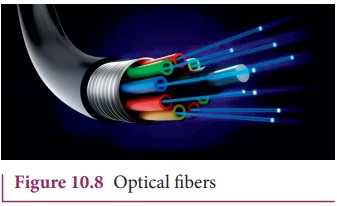Applications, Merits, Demerits - Fibre Optic Communication | 12th Physics : UNIT 10b : Communication Systems
Chapter: 12th Physics : UNIT 10b : Communication Systems
Fibre Optic Communication
FIBRE OPTIC COMMUNICATION
The method of transmitting information from one place to another
in terms of light pulses through an optical fiber is called fiber optic
communication. It works under the principle of
total internal reflection.

Light has very high frequency (400
THz – 790 THz) than microwave radio systems. The fibers are made up of silica
glass or silicon dioxide which is highly abundant on Earth.
Now it has been replaced with
materials such as chalcogenide glasses, fluoroaluminate crystalline materials
because they provide larger infrared wavelength and better transmission
capability.
As fibers are not electrically
conductive, it is preferred in places where multiple channels are to be laid
and isolation is required from electrical and electromagnetic interference.
Applications
Optical fiber system has a number of
applications namely, international communication, inter-city communication,
data links, plant and traffic control and defense applications.
Merits
• Fiber cables are
very thin and weigh lesser than copper cables.
• This system has
much larger band width. This means that its information carrying capacity is
larger.
• Fiber optic
system is immune to electrical interferences.
• Fiber optic cables are cheaper
than copper cables.
Demerits
• Fiber optic
cables are more fragile when compared to copper wires.
• It is an expensive technology.
Fiber optic cables provide the
fastest transmission rate compared to any other form of transmission. It can
provide data speed of 1 Gbps for homes and business. Multimode fibers operate
at the speed of 10 Mbps. Recent developments in optical communication provide
the data speed at the rate of 25 Gbps
Most transatlantic telecommunication
cables between the United States of America and Europe are fiber optic.
Related Topics